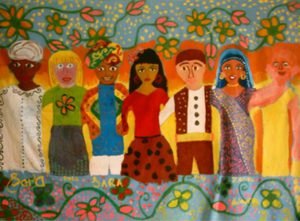The Relevance of Culture to Doula Care

One of the guiding principles of excellent doula care is to meet the dying person and family where they are. This principle affects every aspect of the work doulas do, from how they listen and communicate, to how directly involved they get in physical care and touch, the way they support people emotionally, how they inform people about symptoms and prognosis, to how they prepare them for the grieving process, and the kinds of ritual they help create. And every one of these areas of interaction and care are affected by culture. Consciously or unconsciously culture affects all of our actions, speech, the way we perceive reality, the things we hope for, even the way we think.
This article will be the first in a series of articles that considers the role of culture in the way we approach and care for the dying. Here we will explore the need for understanding culture and how we arrive at cultural sensitivity. Later articles will take a look at particular cultures and how they approach death and dying.
We all come to death from different cultural backgrounds and influences. How a person behaves, what they want to know about their illness, how treatment decisions are made and by whom, the place they choose to die, and how they interrelate with family can all be impacted by culture. It isn’t enough to know the cultural background of the dying person and family to understand the impact of culture on their dying process. A doula needs to know how deeply involved people are with their cultural heritage, how thoroughly they have opened themselves to core American values, and how personal experiences may have altered their cultural understanding. We also need to understand the strength of culture in the community in which a person lives and the influence of particular cultural institutions in that community.
A person’s orientation to his or her culture is also influenced by work experience, level of education, and shifts in the wider cultural stew that seep across cultural boundaries and across generations. So doulas should be avid learners of culture, exploring the cultures that they regularly encounter in the area in which they work. Doulas should read about particular cultures in ethnographic articles and studies as well as through literature. It is also good to talk to organizations that serve people of different cultures to learn more about that culture directly and understand the more subtle aspects of culture from people who live it. And doulas should share with each other discoveries about the impact of culture on death and dying as they serve people with different cultural backgrounds.
No matter how literate a doula becomes in a culture he or she still needs to assess the cultural orientation of each individual, which is impacted by experiences they have had over a lifetime within and beyond the culture they were born into or adopted. We may expect certain attitudes toward symptom management, truth telling around illness and prognosis, and where a person wants to die. But until we actually ask the person directly about culture and carefully observe their behavior we won’t know for sure what part culture plays in their actions, decisions, and wishes.
There are a number of assessment tools that can help a doula think about the kinds of questions they can ask to uncover the influence of culture. Another guiding principle of good doula care is to start with open-ended questions and then get more specific information through asking clarifying questions. Keeping this in mind, one of the first questions a doula might ask to start a cultural assessment is: “Tell me about your culture so I can understand how best to serve you and provide appropriate care.”
An area that needs early assessment is how this person communicates with family and health care professionals around issues related to death and dying. This can involve paying attention to the words they use, how open they seem, subjects that may be taboo, nonverbal cues, how freely they ask questions or seek additional information, their level of trust toward different sets of people. The doula should ask if the dying person makes their own decisions about care or who else might make decisions with or for them.
Another area we need to assess early on is how the family is defined, how closeness is valued in the family, the involvement of the family in caregiving, and the most important members of the family when it comes to different aspects of care. From there the doula should assess beliefs around symptom management, objects or symbols that carry cultural significance in the space around the dying person, the use of touch, music, liturgy, prayer, meditation, ritual, and the importance of community organizations or cultural representatives. The doula also needs to assess how strict the person’s orientation is toward their culture and where they are the most open to other cultural influences.
The information we have provided here only scratches the surface. You can look into some of the established tools for assessing culture as a way to further your cultural sensitivity and assessment skills. Some tools to consider come from Giger and Davidhizar, Huff and Kline, Kagawa-Singer and Blackhall. In the next article on culture—early in 2017—we will explore Chinese culture as it relates to caring for the dying and working with their family.
